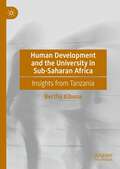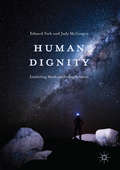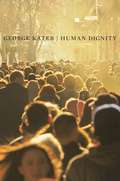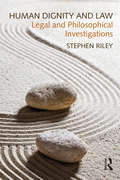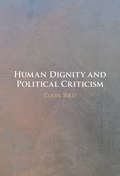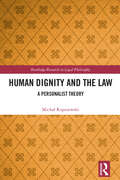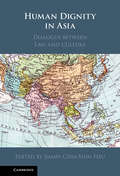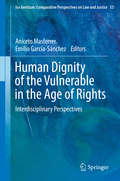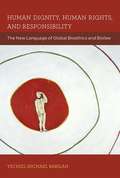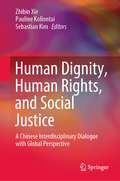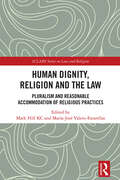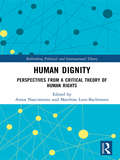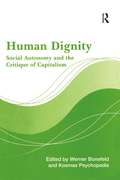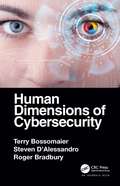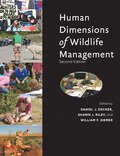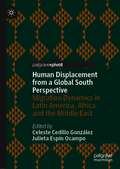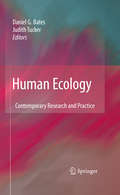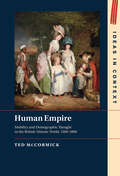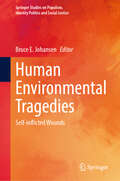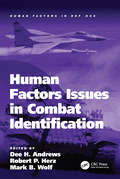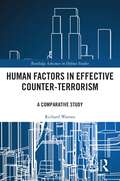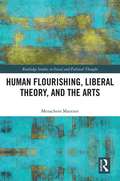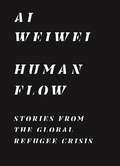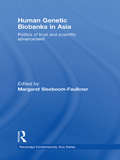- Table View
- List View
Human Development and the University in Sub-Saharan Africa: Insights from Tanzania
by Bertha KibonaThis book utilises a human development and capability approach to examine the role of higher education in the context of Tanzania. The author considers decolonisation debates as they relate to African concerns in order to make a case for systems design and implementation implications for decolonising higher education institutions. The book will be of interest to students, scholars and policymakers in the field of higher education.
Human Dignity
by Aharon BarakHuman dignity is now a central feature of many modern constitutions and international documents. As a constitutional value, human dignity involves a person's free will, autonomy, and ability to write a life story within the framework of society. As a constitutional right, it gives full expression to the value of human dignity, subject to the specific demands of constitutional architecture. This analytical study of human dignity as both a constitutional value and a constitutional right adopts a legal-interpretive perspective. It explores the sources of human dignity as a legal concept, its role in constitutional documents, its content, and its scope. The analysis is augmented by examples from comparative legal experience, including chapters devoted to the role of human dignity in American, Canadian, German, South African, and Israeli constitutional law.
Human Dignity
by Edward Sieh Judy McgregorThis book examines the concept of dignity from a variety of global perspectives. It scrutinizes how dignity informs policy and practice, and is influenced by international and domestic law, human rights values, and domestic politics. An exciting collection of essays, this edited volume provides an analysis of human rights as they are experienced by real people who have in many cases been forced to take action to further their own interests. Readers will discover an extensive range of issues discussed, from the internet, climate change and disabilities, to globalization, old-age, and migrants' rights. The last section deals with the impact of various issues on indigenous and migrant populations, specifically violence in Columbia, border issues in Tijuana, women's and children's rights violations, and the complex problems experienced by refugees, particularly in regards to citizenship. The interdisciplinary nature of this work makes it an invaluable read for scholars of Health Studies, Law, Human Rights, Sociology and Politics.
Human Dignity
by George KatebWe often speak of the dignity owed to a person. And dignity is a word that regularly appears in political speeches. Charters are promulgated in its name, and appeals to it are made when people all over the world struggle to achieve their rights. But what exactly is dignity? When one person physically assaults another, we feel the wrong demands immediate condemnation and legal sanction. Whereas when one person humiliates or thoughtlessly makes use of another, we recognize the wrong and hope for a remedy, but the social response is less clear. The injury itself may be hard to quantify. Given our concern with human dignity, it is odd that it has received comparatively little scrutiny. Here, George Kateb asks what human dignity is and why it matters for the claim to rights. He proposes that dignity is an “existential” value that pertains to the identity of a person as a human being. To injure or even to try to efface someone’s dignity is to treat that person as not human or less than human—as a thing or instrument or subhuman creature. Kateb does not limit the notion of dignity to individuals but extends it to the human species. The dignity of the human species rests on our uniqueness among all other species. In the book’s concluding section, he argues that despite the ravages we have inflicted on it, nature would be worse off without humanity. The supremely fitting task of humanity can be seen as a “stewardship” of nature. This secular defense of human dignity—the first book-length attempt of its kind—crowns the career of a distinguished political thinker.
Human Dignity and Law: Legal and Philosophical Investigations
by Stephen RileyThis book argues that human dignity and law stand in a privileged relationship with one another. Law must be understood as limited by the demands made by human dignity. Conversely, human dignity cannot be properly understood without clarifying its interaction with legal institutions and legal practices. This is not, then, a survey of the uses of human dignity in law; it is a rethinking of human dignity in relation to our principles of social governance. The result is a revisionist account of human dignity and law, one focused less on the use of human dignity in our regulations and more on its constitutive implications for the governance of the public realm.The first part conducts a wide-ranging moral, legal and political analysis of the nature and functions of human dignity. The second part applies that analysis to three fields of legal regulation: international law, transnational law, and domestic public law.The book will appeal to scholars in both philosophy and law. It will also be of interest to political theorists, particularly those working within the liberal tradition or those concerned with institutional design.
Human Dignity and Political Criticism
by Colin BirdMany, including Marx, Rawls, and the contemporary 'Black Lives Matter' movement, embrace the ambition to secure terms of co-existence in which the worth of people's lives becomes a lived reality rather than an empty boast. This book asks whether, as some believe, the philosophical idea of human dignity can help achieve that ambition. Offering a new fourfold typology of dignity concepts, Colin Bird argues that human dignity can perform this role only if certain traditional ways of conceiving it are abandoned. Accordingly, Bird rejects the idea that human dignity refers to the inherent worth or status of individuals, and instead reinterprets it as a social relation, constituted by affects of respect and the modes of mutual attention which they generate. What emerges is a new vision of human dignity as a vital political value, and an arresting vindication of its role as an agent of critical reflection on politics.
Human Dignity and the Law: A Personalist Theory (Routledge Research in Legal Philosophy)
by Michał RupniewskiThis book reassesses the relationship between human dignity, law, and specifically the ‘personalist’ school of agency. The work argues that a specific way of appreciating dignity is contained in how law understands the person, and so can be used to improve upon how we explain and interpret the law. Despite considerable differences between jurisdictions as regards human dignity in application, it is argued that the particular weight of human persons is the widely shared focal point. The central claim, therefore, is that the law recognises, and tries to foster, the status of personhood, and, drawing on the work of Karol Wojtyła, the author develops a ‘Status of Personhood Theory’. The book will be of interest to academics and researchers working in the areas of Legal Philosophy, Jurisprudence, Philosophy, Ethics and Political Theory.
Human Dignity in Asia: Dialogue between Law and Culture
by Hsu, Jimmy Chia-ShinUsing interdisciplinary methods, this book is a pioneering exploration of Asian understandings of human dignity and human rights. It encompasses rigorous scrutiny of dignity jurisprudence in major Asian apex courts, detailed philosophical analysis of dignity in religious traditions, and contextualized socio-political analysis of religious dignity discourse in several Asian societies. This is an innovative systematic survey of how human dignity is understood in Asia, demonstrating how those understandings converge and diverge with other parts of the world. Synthesising legal, philosophical, and sociological expertise, this volume furthers the dialogue between Asia and the West, and advances debates on whether human rights are universal or particular to any one region. As many of the world's liberal democracies are challenged by polarization and populism, this comparative study of human dignity broadens our horizons and offers a potential alternative to a rigidified social imagination.
Human Dignity of the Vulnerable in the Age of Rights
by Aniceto Masferrer Emilio García-SánchezThis volume is devoted to exploring a subject which,on the surface, might appear to be just a trending topic. In fact, it is muchmore than a trend. It relates to an ancient, permanent issue which directlyconnects with people's life and basic needs: the recognition and protection ofindividuals' dignity, in particular the inherent worthiness of the mostvulnerable human beings. The content of this book is described well enough byits title: 'Human Dignity of theVulnerable in the Age of Rights'. Certainly, we do not claim that only thehuman dignity of vulnerable people should be recognized and protected. Werather argue that, since vulnerability is part of the human condition, humanvulnerability is not at odds with human dignity. To put it simply, humandignity is compatible with vulnerability. A concept of human dignity which discards or deniesthe dignity of the vulnerable and weak is at odds with the real humancondition. Even those individuals who might seem more skilled and talented arefragile, vulnerable and limited. We need to realize that human condition is notlimitless. It is crucial to re-discover a sense of moderation regardingourselves, a sense of reality concerning our own nature. Some lines of thoughttake the opposite view. It is sometimes argued that humankind is - or is calledto be - powerful, and that the time will come when there will be novulnerability, no fragility, no limits at all. Human beings will become likeGod (or what believers might think God to be). This perspective rejects humanvulnerability as in intrinsic evil. Those who are frail or weak, who are notautonomous or not able to care for themselves,do not possess dignity. In this volume it is claimed that vulnerability is aninherent part of human condition, and because human dignity belongs to allindividuals, laws are called to recognize and protect the rights of all ofthem, particularly of those who might appear to be more vulnerable and fragile.
Human Dignity, Human Rights, and Responsibility
by Yechiel Michael Barilan"Human dignity" has been enshrined in international agreements and national constitutions as a fundamental human right. The World Medical Association calls on physicians to respect human dignity and to discharge their duties with dignity. And yet human dignity is a term--like love, hope, and justice--that is intuitively grasped but never clearly defined. Some ethicists and bioethicists dismiss it; other thinkers point to its use in the service of particular ideologies. In this book, Michael Barilan offers an urgently needed, nonideological, and thorough conceptual clarification of human dignity and human rights, relating these ideas to current issues in ethics, law, and bioethics. Combining social history, history of ideas, moral theology, applied ethics, and political theory, Barilan tells the story of human dignity as a background moral ethos to human rights. After setting the problem in its scholarly context, he offers a hermeneutics of the formative texts on Imago Dei; provides a philosophical explication of the value of human dignity and of vulnerability; presents a comprehensive theory of human rights from a natural, humanist perspective; explores issues of moral status; and examines the value of responsibility as a link between virtue ethics and human dignity and rights. Barilan accompanies his theoretical claim with numerous practical illustrations, linking his theory to such issues in bioethics as end-of-life care, cloning, abortion, torture, treatment of the mentally incapacitated, the right to health care, the human organ market, disability and notions of difference, and privacy, highlighting many relevant legal aspects in constitutional and humanitarian law.
Human Dignity, Human Rights, and Social Justice: A Chinese Interdisciplinary Dialogue with Global Perspective
by Pauline Kollontai Sebastian Kim Zhibin XieThis book explores human dignity, human rights and social justice based on a Chinese interdisciplinary dialogue and global perspectives. In the Chinese and other global contexts today, social justice has been a significant topic among many disciplines and we believe it is an appropriate topic for philosophers, theologians, legal scholars, and social scientists to sit together, discuss, enrich each other, and then deepen our understanding of the topic. Many of them are concerned with the conjuncture between social justice, human rights, and human dignity. The questions this volume asks are: what’s the place of human rights in social justice? How is human dignity important in the discourse on human rights? And, through these inquiries, we ask further: how is possible to achieve humanist justice? This volume presents the significance, challenges, and constraints of human dignity in human rights and social justice and addresses the questions through philosophical, theological, sociological, political, and legal perspectives and these are placed in dialogue between the Chinese and other global settings. We are concerned with the norms regarding human dignity, human rights and social justice while we take seriously into account their practice. This volume consists of two main sections. The first section examines Chinese perspectives on human rights and social justice, in which both from Confucianism and Christianity are considered and the issues such as patriotism, religious freedom, petition, social protest, the rights of marginalized people, and sexual violence are studied. The second section presents the perspectives of Christian public theologians in the global contexts. They examine the influence of Christian thought and practice in the issues of human rights and social justice descriptively and prescriptively and address issues such as religious laws and rights, diaconia, majoritarianism, general equality, social-economic disparities, and climate justice from global perspectives including in the contexts of America, Australia, Israel and Europe. With contributions by experts from mainland China, Hong Kong, South Korea, Australia, New Zealand, the UK, USA and Norway, the book provides valuable cross-cultural and interdisciplinary insights and perspectives. As such it will appeal to political and religious leaders and practitioners, particularly those working in socially engaged religious and civil organizations in various geopolitical contexts, including the Korean Peninsula and Japan.
Human Dignity, Religion and the Law: Pluralism and Reasonable Accommodation of Religious Practices (ISSN)
by Mark Hill Kc María-José Valero-EstarellasThe concept of human dignity is already embedded in the constitutional architecture of the European Union and throughout the world, but it remains a slippery and elusive concept. In this volume, leading commentators from across the globe address the shift from the monolithic influence of major world religions in the past towards religious pluralism coupled with the increased secularism of civil society. The contributors, drawn from different backgrounds and traditions, explore how the deployment of a nuanced understanding of human dignity can provide a way to maximise religious liberty for all within liberal democracies. Specific consideration is given to the reasonable accommodation of religious practices through exemptions to generally applicable laws, conscientious objection on the grounds of religious beliefs, the interplay between religious pluralism and legal pluralism, balancing religious sensibilities with same-sex marriage, exercising the right to change one’s religion, both generally and with a particular focus on data protection, protecting the right to asylum in the light of recent changes in migratory flows and exploring its impact on those enjoying non-theistic beliefs, as well as the complex relationship between the Ukrainian and Russian Orthodox Churches in these febrile times. Through the prism of informed investigation of these matters of specificity, the volume offers readers fresh insights and analysis which collectively contribute to an overall picture of governments in liberal democracies being encouraged and enabled to foster laws and practices whereby pluralism can be encouraged, and human dignity can flourish. The book will be of interest to academics, researchers and policy-makers working in the areas of Law and Religion, Human Rights Law, Constitutional Law and International Relations.
Human Dignity: Perspectives from a Critical Theory of Human Rights (Rethinking Political and International Theory)
by Amos Nascimento Matthias Lutz BachmannConnecting three generations of critical theorists, this edited collection focuses on the mutual complementarity between the concept of "human dignity" and the theory and practice of human rights. Human dignity has recently emerged as a controversial theme in the philosophy of human rights and has become the subject of a growing debate involving theological, political, juridical, moral, and biomedical perspectives. Previously, interpretations of this concept took for granted specific definitions of this term without accounting for the perspective offered by a "Critical Theory of Human Rights." This interdisciplinary perspective relies on a tradition that goes from Immanuel Kant to Jürgen Habermas, influences new generations, and sheds more light on how human dignity is used (and abused) in contemporary discourses. Based on this tradition, the contributors sustain an engaged discussion of the topic and address issues such as domination, colonialism, multiculturalism, globalization, and cosmopolitanism. Informed by different contexts, each author offers a unique contribution to distinctive aspects of the necessary internal correlation between human dignity and human rights. This book will be of interest to students and researchers in human rights in Europe, North America, and Latin America and readers in the areas of political science, philosophy, sociology, law, and international relations.
Human Dignity: Social Autonomy and the Critique of Capitalism
by Werner Bonefeld Kosmas PsychopedisAgainst the background of growing uncertainty about the future development of capitalism, and in the face of war, terror and poverty, this book asks: What do we have to know to prevent misery? What can we do to achieve conditions of human dignity? And what must we hope for? The volume argues that all social life is essentially practical and explores the central most important value of human dignity. It discusses practical consequences in relation to the theory of revolution and contemporary anti-globalization struggles. Targeted towards advanced undergraduate courses and taught post-graduate courses in the field of politics, sociology, political philosophy and new social movement studies, it should also be welcomed in the study of critical theory, Marxism, labour studies and revolutionary thought.
Human Dimensions of Cybersecurity
by Terry Bossomaier Steven D'Alessandro Roger Bradbury"In Human Dimensions of Cyber Security, Terry Bossomaier, Steven D’Alessandro, and Roger Bradbury have produced a book that … shows how it is indeed possible to achieve what we all need; a multidisciplinary, rigorously researched and argued, and above all accessible account of cybersecurity — what it is, why it matters, and how to do it." --Professor Paul Cornish, Visiting Professor, LSE IDEAS, London School of Economics Human Dimensions of Cybersecurity explores social science influences on cybersecurity. It demonstrates how social science perspectives can enable the ability to see many hazards in cybersecurity. It emphasizes the need for a multidisciplinary approach, as cybersecurity has become a fundamental issue of risk management for individuals, at work, and with government and nation states. This book explains the issues of cybersecurity with rigor, but also in simple language, so individuals can see how they can address these issues and risks. The book provides simple suggestions, or cybernuggets, that individuals can follow to learn the dos and don’ts of cybersecurity. The book also identifies the most important human and social factors that affect cybersecurity. It illustrates each factor, using case studies, and examines possible solutions from both technical and human acceptability viewpoints.
Human Dimensions of Wildlife Management
by Daniel J. DeckerUpdated and revised, this classic work is a must-read for every student of wildlife management and every professional seeking to become a better manager.Wildlife professionals can more effectively manage species and social-ecological systems by fully considering the role that humans play in every stage of the process. Human Dimensions of Wildlife Management provides the essential information that students and practitioners need to be effective problem solvers. Edited by three leading experts in wildlife management, this textbook explores the interface of humans with wildlife and their sometimes complementary, often conflicting, interests. The book's well-researched chapters address conservation, wildlife use (hunting and fishing), and the psychological and philosophical underpinnings of wildlife management. Human Dimensions of Wildlife Management explains how a wildlife professional should handle a variety of situations, such as managing deer populations in residential areas or encounters between predators and people or pets.This thoroughly revised and updated edition includes detailed information about• systems thinking• working with social scientists• managing citizen input• using economics to inform decision making• preparing questionnaires• ethical considerations
Human Displacement from a Global South Perspective: Migration Dynamics in Latin America, Africa and the Middle East
by Celeste Cedillo González Julieta Espín OcampoThis book focuses on inclusion and governance agenda on the issue of migration within a framework of South-South cooperation. Increasing migration waves present an extraordinary and complex challenge to the international community. In the existing literature, migration processes have been described mostly from Western perspectives, and although these perspectives are analytically relevant, they lack the advantage of a broader interpretation. Taking a Global South approach, this volume gives voices to authors from several Latin American and Latin European universities to offer a more dynamic discussion of the challenges of migration in the twenty-first century. The authors take a broad perspective of global migration, with a focus on case studies from the Global South that highlight Latin American and North African experiences in particular.
Human Ecology
by Judith Tucker Daniel G. BatesThis comprehensive sourcebook on human ecology combines 25 source articles published in the journal Human Ecology, enhanced with new research updates and thematic commentary. Intended as a follow up to Case Studies in Human Ecology, this volume includes an entirely new group of articles, with the same accessible, comprehensive coverage that made Case Studies so popular. Human Ecology: Research and Practice covers four important areas: Philosophy, Theory and Methods; Changing Subsistence Practices; Agricultural Intensification and Population Dynamics; and, Common Property Resources and Conservation. As a group, these articles represent the major contributions to the study of Human Ecology since the publication of the previous volume. Each article includes a concise introduction by the Editor, giving necessary and thoughtful context. The volume covers an overview of human ecology as a field within environmental studies, new directions in contemporary research, new methods and techniques, and cultural landscapes. Anyone studying human ecology, environmental studies, landscape studies, or population dynamics, particularly key issues such as conservation and globalization will find this comprehensive reader a valuable resource.
Human Empire: Mobility and Demographic Thought in the British Atlantic World, 1500–1800 (Ideas in Context)
by Ted McCormickArguing that demographic thought begins not with quantification but in attempts to control the qualities of people, Human Empire traces two transformations spanning the early modern period. First was the emergence of population as an object of governance through a series of engagements in sixteenth- and seventeenth-century England, Ireland, and colonial North America, influenced by humanist policy, reason of state, and natural philosophy, and culminating in the creation of political arithmetic. Second was the debate during the long eighteenth century over the locus and limits of demographic agency, as church, civil society, and private projects sought to mobilize and manipulate different marginalized and racialized groups – and as American colonists offered their own visions of imperial demography. This innovative, engaging study examines the emergence of population as an object of knowledge and governance and connects the history of demographic ideas with their early modern intellectual, political, and colonial contexts.
Human Environmental Tragedies: Self-inflicted Wounds (Springer Studies on Populism, Identity Politics and Social Justice)
by Bruce E. JohansenThis volume examines environmental disasters worldwide, often stemming from extractive industries like fossil fuels. Questioning human desires for comfort, convenience, and national defense, it confronts the relentless pursuit of profit in a capitalist system. From the development of nuclear weapons to the damaging effects of climate change, the book questions humanity's capacity to address these challenges. As temperatures soar, can we endure inconvenience and unite globally to tame climate change? From the lethal coal mines of India to the haunting aftermath of nuclear testing in the Marshall Islands, each chapter presents different cases of struggles against relentless exploitation. Among other topics, the book discusses China's environmental crisis, Nigeria's oil-infested lands, and Australia's uranium conflicts. It sheds light on the Amazon's indigenous defenders confronting mining and disease, while Vietnam and Cambodia grapple with the enduring legacy of Agent Orange. Finally, it looks into the Philippines' battle against mining giants and mirrors Russia's oil-ravaged reindeer herders. Presenting the fight for survival against the onslaught of profit-driven extraction, the volume pictures a world where tradition clashes with modernity, and where the price of progress is often paid in blood and displacement. Hence, this book underscores the urgent need for cooperation in safeguarding our planet's future.
Human Factors Issues in Combat Identification (Human Factors in Defence)
by Dee H. Andrews Robert P. Herz Mark B. WolfThis edited book presents an array of approaches on how human factors theory and research addresses the challenges associated with combat identification. Special emphasis is placed on reducing human error that leads to fratricide, which is the unintentional death or injury of friendly personnel by friendly weapons during an enemy engagement. Although fratricide has been a concern since humans first engaged in combat operations, it gained prominence during the Persian Gulf War. To reduce fratricide, advances in technological approaches to enhance combat identification (e.g., Blue Force Tracker) should be coupled with the application of human factors principles to reduce human error. The book brings together a diverse group of authors from academic and military researchers to government contractors and commercial developers to provide a single volume with broad appeal. Human Factors Issues in Combat Identification is intended for the larger human factors community within academia, the military and other organizations that work with the military such as government contractors and commercial developers as well as others interested in combat identification issues including military personnel and policy makers.
Human Factors in Effective Counter-Terrorism: A Comparative Study (Routledge Advances in Defence Studies)
by Richard WarnesThis book seeks to provide a comparative assessment of the significance of ‘human factors’ in effective counter-terrorism. The phrase ‘human factors’ is used to describe personal relationships, individual capabilities, effective leadership, technical interface, organisational culture and the community engagement necessary to effectively minimise, counter and control the threat of terrorism. Unlike many works in the field, this book is constructed around the input of ‘experienced knowledge’ from over 170 semi-structured interviews of specialist military, policing, intelligence and security practitioners - those actors actually involved in countering terrorism. These practitioners come from seven countries – the United Kingdom, Ireland, France, Spain, Israel, Turkey and the United States – all of which have suffered over the years from different types of terrorist threat and responded with a mixture of counter-terrorist measures. Where military practitioners also discussed overseas counter-insurgency measures, that material has been included, since terrorism forms a key aspect of such wider insurgencies. The resulting interview data was analysed through a variant of ‘Grounded Theory’ to identify key emerging themes and issues, both positive and negative, relevant to ‘human factors’ in the individual countries and more generically. This book incorporates the informed operational experiences and insights of the interviewees while seeking to provide examples of successful counter-terrorist measures at the strategic, operational and tactical levels. This book will be of much interest to students of counter-terrorism, defence studies and security studies in general.
Human Flourishing, Liberal Theory, and the Arts: A Liberalism of Flourishing (Routledge Studies in Social and Political Thought)
by Menachem MautnerThis book claims that in addition to autonomy, liberal tradition recognizes human flourishing as an ideal of the good life. There are two versions of the liberalism of flourishing: for one the good life consists in the ability of an individual to develop her intellectual and moral capabilities, and for the other the good life is one in which an individual succeeds in materializing her varied human capabilities. Both versions expect the state to create the background conditions for flourishing. Combining the history of ideas with analytical political philosophy, Menachem Mautner finds the roots of the liberalism of flourishing in the works of great philosophers, and argues that for individuals to reach flourishing they need to engage with art. Art provides us with wisdom, insight, critical social and political thinking, and moral education. Thus, a state which practices the liberalism of flourishing must play an active role in funding the creation and dissemination of art. Consequently, the liberalism of flourishing is better equipped than autonomy liberalism to compete with religion in the domains of meaning and over the shape of the regime, the political culture and the law in countries in which liberalism is contested. Political theorists and lawyers will enjoy engaging with this version of liberalism, as will students of social democracy and art policy.
Human Flow: Stories from the Global Refugee Crisis
by Weiwei AiA powerful portrait of the greatest humanitarian emergency of our time, from the director of Human FlowIn the course of making Human Flow, his epic feature documentary about the global refugee crisis, the artist Ai Weiwei and his collaborators interviewed more than 600 refugees, aid workers, politicians, activists, doctors, and local authorities in twenty-three countries around the world. A handful of those interviews were included in the film. This book presents one hundred of these conversations in their entirety, providing compelling first-person stories of the lives of those affected by the crisis and those on the front lines of working to address its immense challenges.Speaking in their own words, refugees give voice to their experiences of migrating across borders, living in refugee camps, and struggling to rebuild their lives in unfamiliar and uncertain surroundings. They talk about the dire circumstances that drove them to migrate, whether war, famine, or persecution; and their hopes and fears for the future. A wide range of related voices provides context for the historical evolution of this crisis, the challenges for regions and states, and the options for moving forward.Complete with photographs taken by Ai Weiwei while filming Human Flow, this book provides a powerful, personal, and moving account of the most urgent humanitarian crisis of our time.
Human Genetic Biobanks in Asia: Politics of trust and scientific advancement (Routledge Contemporary Asia Series)
by Margaret Sleeboom-FaulknerThis volume investigates human genetic biobanking and its regulation in various Asian countries and areas, including Japan, Mainland China, Taiwan, Hong Kong, India and Indonesia.. It sheds light on how cultural, socio-political and economic factors influence the set-up of bioethical regulation for human genetic biobanks and how bioethical sensitivities surrounding biobanks are handled. Apart from placing discourses of trust in an international perspective, the comparative materials presented in this volume also put into perspective the concepts of genetic theft and exploitation, and genetic wealth and trust. This collection contains case studies of biobanking practices in societies with different needs and welfare levels, and provides insights into government strategies towards genetic resources by examining bioethics as practised at home.
